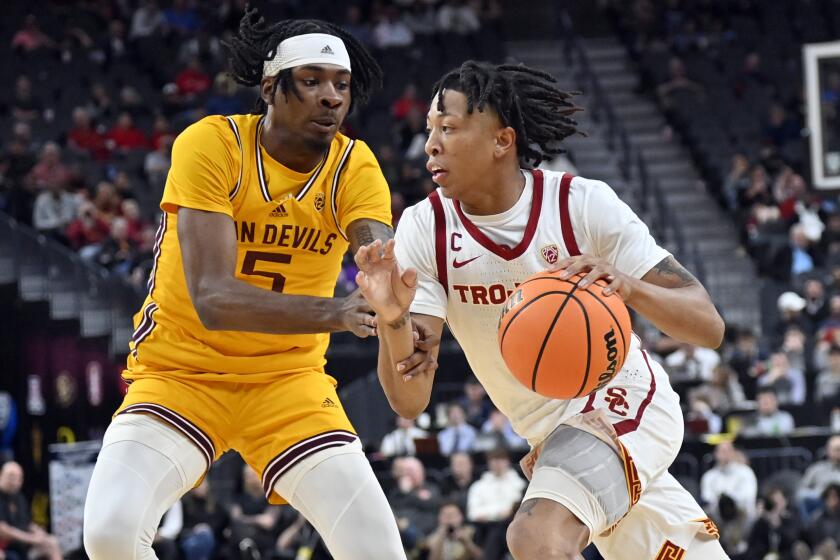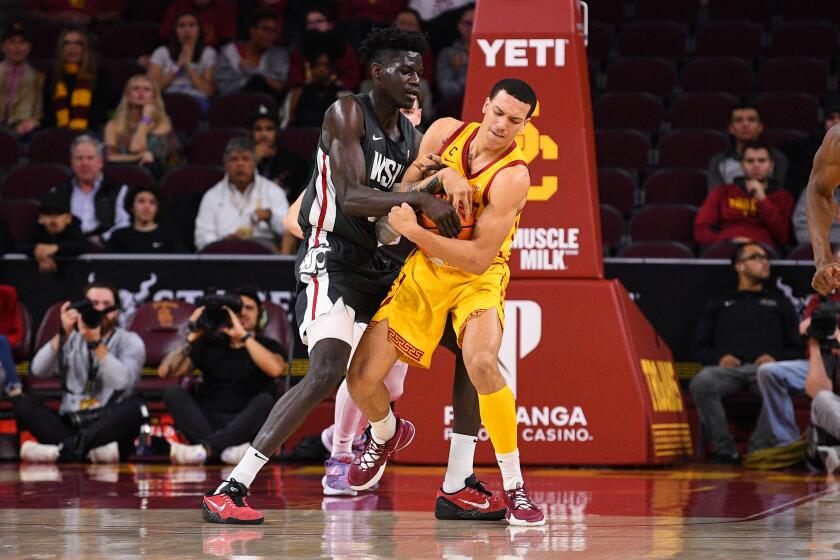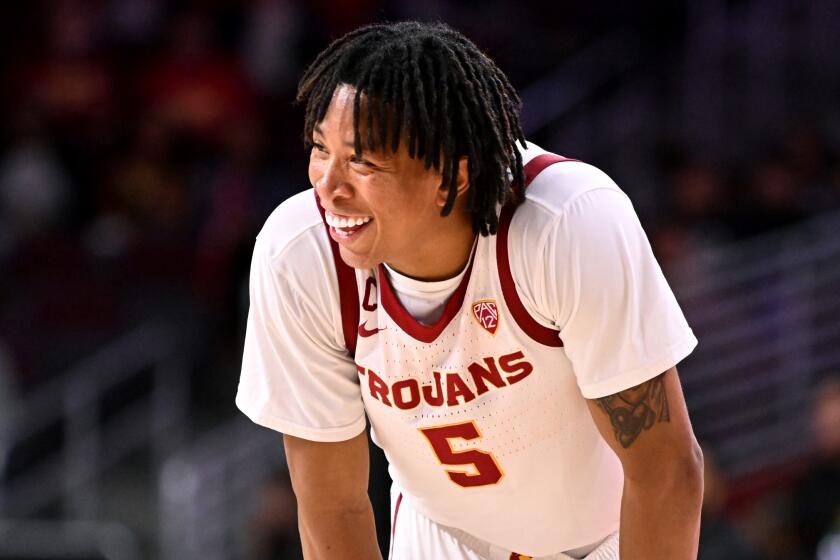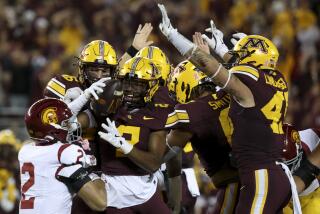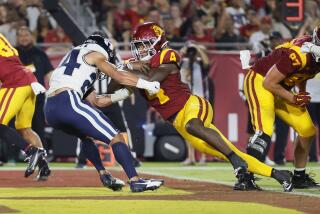How USC overcame growing pains to become Andy Enfield’s ‘most improved team’
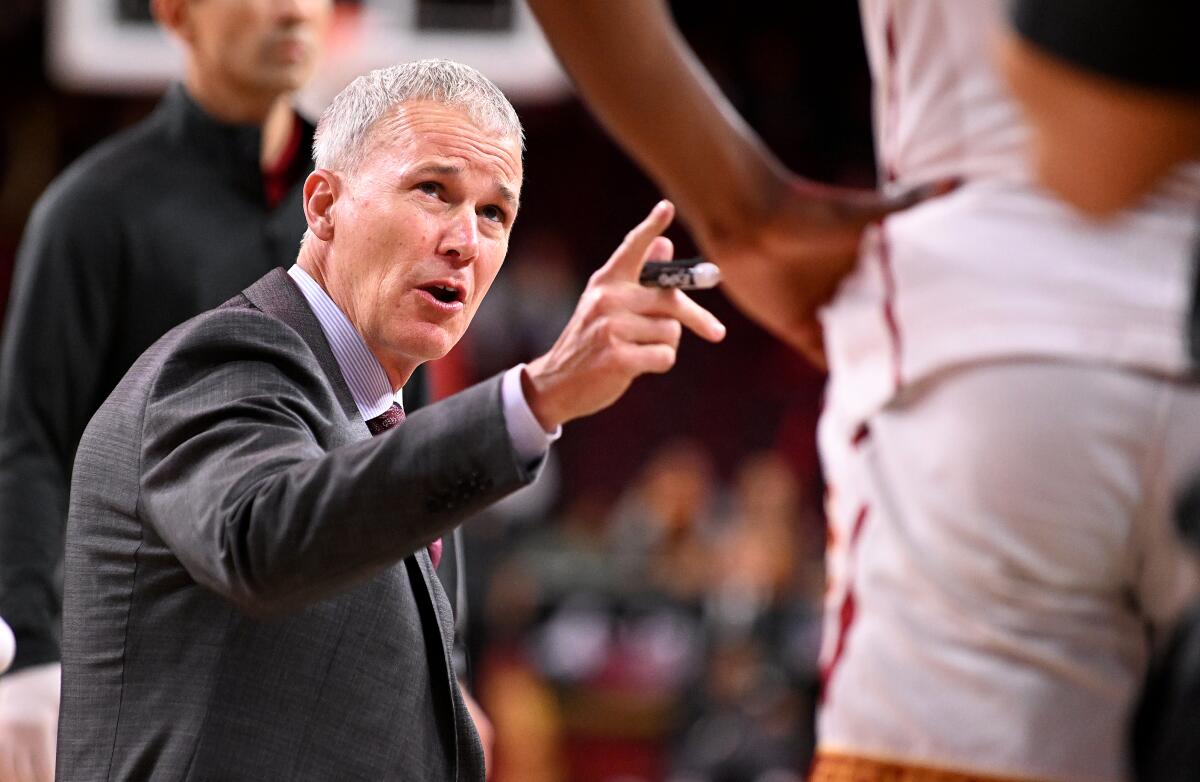
Four months ago, long before his Trojans would secure a third straight trip to the NCAA tournament, Andy Enfield walked off the court following USC’s home opener, worried about what he’d just seen.
You couldn’t have drawn up a more disastrous start for USC. A 13-point defeat at the hands of Florida Gulf Coast, Enfield’s former team, called everything about the upcoming season, his 10th as coach, into question. The new, four-guard approach fell flat. A new, youthful rotation looked lost. The two senior captains struggled. In his postgame media session, Enfield lamented their lack of preparation.
“We were not a very good team,” the coach admitted this week, looking back on the season’s start. “We could’ve played anyone that night and lost. So we were a little nervous.”
To think, by March, those same Trojans barely resemble the group that was trounced on opening night by Florida Gulf Coast, a team that ultimately finished ninth in the Atlantic Sun Conference. USC lost just one game at Galen Center the rest of the season. The Trojans won 22 total, a mark reached for the sixth time in seven years. And it sneaked into the NCAA tournament for the fifth time under Enfield, the most trips ever by a Trojans coach.
The path USC took from that disappointing night in November to Friday’s first-round matchup with Michigan State in Columbus, Ohio, sets it apart from other teams Enfield has coached at USC.
USC earned its third straight berth into the NCAA men’s basketball tournament. The Trojans will play Michigan State on Friday in Columbus, Ohio.
“This is probably the most improved team I’ve had at USC from the beginning of the year to the end,” Enfield declared last week.
Even before its clumsy beginning, Enfield understood this season might be an uphill climb. He had just two players he knew he could rely on in Boogie Ellis and Drew Peterson, and they were hardly the most reliable players at that point. Peterson was prone to erratic stretches and needed to bulk up physically, while Ellis had never proved to be a complete point guard, capable of creating for others.
But as Enfield saw it, the season hinged on how his two seniors performed. The staff put their trust in Ellis especially, opting not to bring in another point guard to push him. The vote of confidence meant a lot to the senior captain, considering his struggles at the end of the previous season.
“He didn’t go and get anyone out of the transfer portal,” Ellis said. “He trusted me and believed in my game and allowed me to really develop and be a true lead guard.”
The trust was rewarded, as Ellis developed into one of the best playmaking point guards in the country by season’s end. Over the last two months especially, Ellis has unlocked another level of his game, averaging better than 22 points over USC’s final dozen games.
But it would take more than a major leap from its point guard to turn the Trojans into a tournament team.
Kobe Johnson played just 7.5 minutes per game as a freshman, the 10th man in a 10-man rotation. He’d taken a mere 34 shots the entire previous season when Enfield plugged him into the lineup as a sophomore.
USC coach Andy Enfield says Kobe Johnson, who was stellar in the Trojans’ win over Washington State on Thursday, is ‘the best defender in the Pac-12.’
He’s been essential to USC’s rotation ever since, developing into one of the best on-ball defenders in college basketball, a byproduct of the program’s patience. He’s even become a steady offensive contributor, scoring nine points per game.
“When you have good players that are young, our philosophy is you have to let them grow,” Enfield said.
That also often means giving them room to learn from their mistakes.
For Tre White, the space was critical early on. The freshman struggled to adjust upon his arrival last summer. But Enfield encouraged him to shake off the misses, to keep firing away. He tried to keep White’s confidence up, letting him work out the kinks on his own.
It wouldn’t take long for him to figure it out as White started 27 of USC’s 31 games, earning a spot on the conference’s all-freshman team.
It didn’t click as quickly for Kijani Wright. The four-star freshman big man was expected to make an immediate impact, but by midseason he’d lost his place in the rotation.
So Enfield and his staff laid out the areas where Wright needed to get better in order to earn it back, all the while trying to stay positive.
“We were very specific with him,” Enfield said. “You have to be a better rebounder, you have to be a better defender. And he took that to heart.”
The staff trusted Wright to figure it out. And by March, he was playing meaningful minutes off the bench.
USC senior Boogie Ellis has become a team leader while persevering during highs and lows. Says trainer Vince Rogers, “He’s in a really good place.”
“Some coaches try to, like, control every little narrative,” White explained. “But I feel like with Coach Andy, he gives us guidelines but he lets us be free. I feel like that’s how we all got better. He doesn’t take our confidence away.”
Their confidence seemed to be soaring before last week’s trip to Las Vegas, when the Trojans were sent packing in the first round of the Pac-12 Conference tournament for the first time since 2014.
The defeat was an abrupt reminder of how little room there is for error for USC this March. But considering where it was in November, no one sees any reason to stop trusting that process now.
“The start of this season, we didn’t know what type of team we were going to be,” center Josh Morgan said. “But we stuck with it. We ran the course, and we ended up finding an identity. Now, towards the end of the season, we’re a much better team than we were at the start.”
More to Read
Go beyond the scoreboard
Get the latest on L.A.'s teams in the daily Sports Report newsletter.
You may occasionally receive promotional content from the Los Angeles Times.

